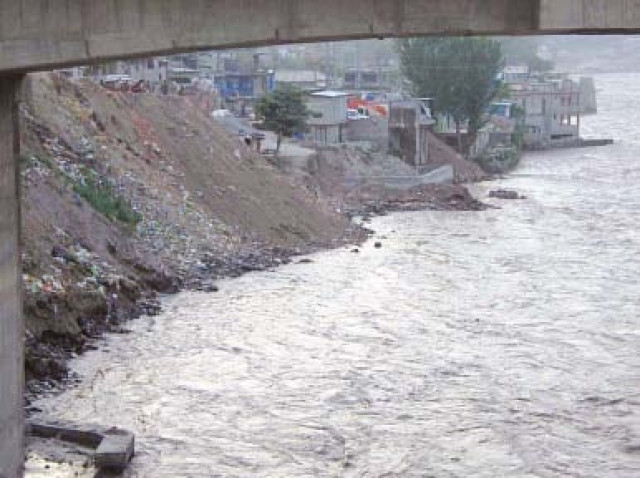Spiralling cost: PM reconstitutes Neelum-Jhelum project board
Cost issue referred to finance ministry as foreign banks hold back.

Prime Minister Yousaf Raza Gilani has reconstituted board of directors of Neelum-Jhelum Hydropower Company, a special purpose vehicle created for executing the project whose cost has escalated to Rs330 billion from Rs130 billion because of delay in work and modification in design after the 2005 earthquake, sources say.
Under the restructuring, chief secretary of Azad Jammu and Kashmir and a representative of the finance ministry have been made board members of the strategic 960-megawatt hydropower project.
The prime minister gave the directives for reconstituting the board during a briefing by the Ministry of Water and Power on the project at the Prime Minister’s House on Monday.
Water and Power Minister Naveed Qamar, Kashmir Affairs and Gilgit-Baltistan Minister Manzoor Ahmad Wattoo, finance secretary, water and power secretary, Economic Affairs Division secretary and other senior officials attended the briefing.
The project management highlighted the hurdles in arranging funds, but expressed the hope they would be removed with ease. Sources said the prime minister referred the issue of cost escalation to the finance ministry as two banks – one from China and one from Abu Dhabi – were reluctant to extend $180 million for the project.
In the briefing, Neelum-Jhelum Hydropower Company Chief Executive Officer General (retd) Mohammad Zubair said the project cost escalated on account of interest on loans at Rs38 billion and depreciation of rupee against dollar from Rs45 to Rs86, increasing the cost by Rs45 billion. In addition to these, the cost went higher because of the rate of land acquisition and procurement of two Tunnel Boring Machines at a cost of Rs17 billion.
Zubair said after winning an arbitration case, the work on the project had resumed and would be completed in 2016. He said the change in the project design, to shield it from earthquakes, caused a substantial increase in cost because it entailed massive additional civil works.
In the meeting, directives were issued that immediate steps should be taken to release machinery for Nandipur power project, which was stuck in Karachi despite the cabinet’s decision to revive the project by early next year.
In a bid to encourage potential investors, Gilani approved a one-window facility and boasted of his government’s performance which he said added 3,500 megawatts of electricity to the national grid.
He said the government would take up the issue of public sector enterprises, which had been making a big dent in the public exchequer for the last many years, in cabinet meetings. The problem of circular debt would also be dealt with to end unscheduled load-shedding.
The prime minister further said important and immediate decisions would be taken for liquefied natural gas (LNG) import which would be utilised to produce 2,200 megawatts of electricity.
Earlier, Kohala hydropower project CEO said work was progressing well and about 28 per cent work had been completed. The meeting also approved reconstitution of the board of directors by including relevant stakeholders.
Published in The Express Tribune, December 13th, 2011.



















COMMENTS
Comments are moderated and generally will be posted if they are on-topic and not abusive.
For more information, please see our Comments FAQ